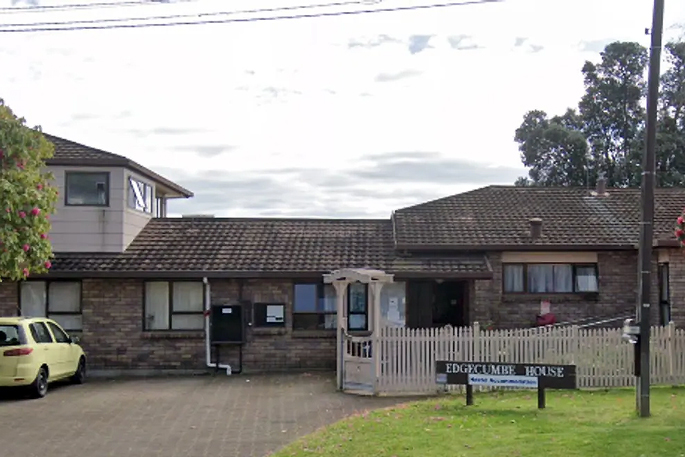A Tauranga boarding house that had several hot water taps removed, no proper cooking facilities and no heating in the main living room must pay 17 tenants $37,000 in damages for not complying with healthy homes standards.
Edgecumbe House also had no extractor fans in the kitchens and bathrooms and multiple tenants were charged bonds more than four weeks' rent.
An investigation into the boarding house was launched after the Ministry for Business, Innovation and Employment began an assessment in June 2022 of the Edgecumbe Rd premises, which was converted from a rest home to a boarding house in 2010.
A complaint was made and the ministry's tenancy compliance and investigations team met with a tenant who confirmed there was no oven, the heater in the living room was disconnected, hot water taps had been removed from the washing machine and two basins, and tenants were being charged for heating in their rooms.
Residents of the 21-bedroom house were mostly made up of ex-prisoners on parole or the homeless requiring emergency housing.
A site inspection was conducted and the TCIT lodged a complaint with the Tenancy Tribunal which found the house failed to comply with the healthy homes standards for heating and ventilation.
It also failed to comply with building health and safety regulations, and the landlord interfered with the supply of water to tenants and charged excessive bonds on multiple occasions, the March 5 decision says.
Landlord and owner Joseph Oh admitted the extractor fan in the kitchen was not working, two of the bathrooms only had windows for ventilation, the living room heater was disconnected, several hot water taps had been removed because tenants did not turn them off properly, the oven was removed from the kitchen as the power supply was insufficient, and tenants on parole were charged a bond more than four weeks' rent because they often caused damage.
Within a month he replaced hot water taps and installed an oven, extractor fans and a heat pump.
However, tribunal adjudicator John Smith says the heat pump was restricted to use between 6pm and 10pm and later Oh gave control of the remote to one tenant.
A separate claim against Oh in the tribunal was withdrawn.
Smith accepts Edgecumbe's actions regarding overcharging for bonds was misguided rather than exploitative but says making ex-prisoners pay more and the number of times it happened are aggravating factors.
Smith did not accept the referring agencies - Corrections and the Ministry of Social Development - were at fault because they are not subject to the Residential Tenancies Act (RTA).
Each of the tenants is to be immediately repaid between $2000 and $2500.
Oh says he's not aware of healthy homes standards but Smith says ignorance of the law is not an excuse and the rules for boarding houses came into effect 12 months before the breaches were discovered.
"As a professional accommodation provider, Edgecumbe was required to inform itself of its legal obligations and to comply with them.
"I do not accept Mr Oh's explanation that he lacked proficiency in English or that, even if he did, this was an excuse."
Oh says the heater in the main living room broke so he provided heaters in the residents' rooms but Smith says the decision not to replace the main heater was intentional.
Oh thought four hotplates, a microwave and an electric frying pan were adequate cooking facilities and says the kitchen was converted from the garage and the oven was removed because the power supply was insufficient and the fuse kept blowing.
Smith says the new 28-litre oven that has since been installed is similar in size to a microwave and he questions whether this is now adequate.
In ordering the damages, Smith also issued a three-year restraining order on Edgecumbe House to prevent further breaches.
TCIT national manager Brett Wilson says the tenants were in a difficult situation and all involved were concerned that raising any issues could cause them to lose their home.
"Due to the extent and scale of the potential harm and the vulnerability of the tenants, TCIT felt it was in the public interest to progress this case to the Tenancy Tribunal and we are pleased to have achieved a positive outcome for the affected tenants," says Wilson.
"Boarding houses are a significant focus for TCIT as they often house some of the most vulnerable people who are not in a position to address any tenancy issues themselves.
"A large number of the residents at this boarding house, in particular, have a history of housing insecurity."



1 comment
Exploitation?
Posted on 10-04-2024 12:10 | By morepork
Reading this, it seems to me that Mr. Oh was just trying to deal with bad behaviour, rather than to make a fortune out of vulnerable people. We shouldn't tolerate people being forced to live in sub-standard conditions and the place needed to be fixed, but if tenants damage or abuse property, then this is going to happen. I tried to imagine being released on parole and trying to start a better life. This is not a good introduction back to society. "A large number of the residents at this boarding house, in particular, have a history of housing insecurity." You have to wonder WHY that is...
Leave a Comment
You must be logged in to make a comment.